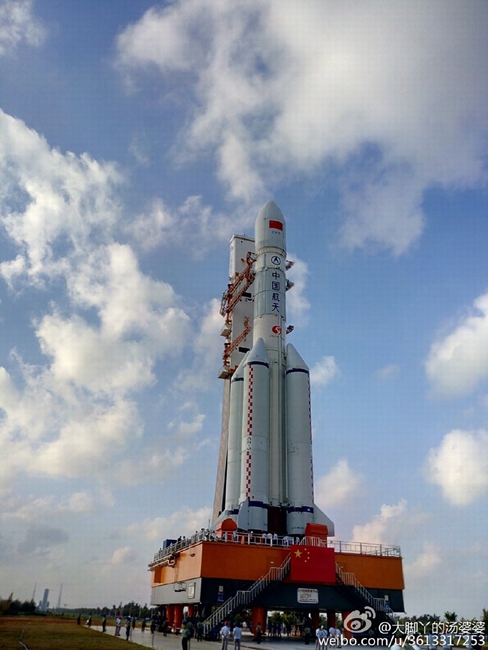


(File photo)
The year 2016 is a big year for China's aerospace industry, as several rockets will be sent into space, including Tiangong-2, an orbiting space lab and Shenzhou-11, a manned spacecraft with two people on board.
Two new types of rockets will be launched in 2016. Long March-7, scheduled to be launched in June, will put the country's first cargo ship, Tianzhou-1, into space in the first half of 2017 to dock with Tiangong-2 and conduct experiments.
Furthermore, Long March-5 is slotted to be sent into space in September of this year. This type of rocket has the largest carrying capacity among the new generation of rockets in China, with a maximum payload capacity of 25 tons to low Earth orbit and 14 tons to geosynchronous transfer orbit.
Both of the launches will take place at the newly constructed Wenchang Satellite Launch Center in south China's Hainan province.
In addition, China will send several experimental satellites into space in 2016. China's retrievable Shijian-10 satellite will be launched in April at the Jiuquan Satellite Launch Center. China will also send a Hard X-ray Modulation Telescope, an X-ray space observatory, and a quantum communication satellite. China plans to launch its first ever carbon-tracking satellite into space in August.
According to a staff member from China's Aerospace Science and Technology Corporation, China plans to conduct more than 20 satellite launch missions in 2016, which positions China to exceed U.S. launches. Among them, a total of 15 launches are significant projects or first flights.
China launched the first of a new generation of navigation satellites for its BeiDou navigation system in 2015. The next of these satellites is set to be launched this year. Gaofen-3 satellite, a Chinese civilian remote sensing satellite, will also be sent into space in 2016.
In addition, China sent a Belarusian communications satellite into space, and will also help the country with its commercial sensing satellites.

(File photo)
 Engineer troop builds bridge in real combat conditions
Engineer troop builds bridge in real combat conditions You can urinate in public in Chongqing
You can urinate in public in Chongqing Rice terrace scenery in southwest China's Yunnan
Rice terrace scenery in southwest China's Yunnan 2016 Miss Chinatown USA pageant held in San Francisco
2016 Miss Chinatown USA pageant held in San Francisco Ancient pagodas across China
Ancient pagodas across China Wedding dress show up in the air
Wedding dress show up in the air Candidates perform in 2nd examination at Beijing Film Academy
Candidates perform in 2nd examination at Beijing Film Academy Russian photographer brings fairytales to life
Russian photographer brings fairytales to life Chinese beauties, foreign models meet in Chengdu
Chinese beauties, foreign models meet in Chengdu Top 20 hottest women in the world in 2014
Top 20 hottest women in the world in 2014 Top 10 hardest languages to learn
Top 10 hardest languages to learn 10 Chinese female stars with most beautiful faces
10 Chinese female stars with most beautiful faces China’s Top 10 Unique Bridges, Highways and Roads
China’s Top 10 Unique Bridges, Highways and Roads Harsher sanctions on NK are inevitable
Harsher sanctions on NK are inevitable Under Pope Francis and President Xi, hopes rise for a thaw in ties
Under Pope Francis and President Xi, hopes rise for a thaw in ties Why top students from African nations are flocking to Chinese vocational schools
Why top students from African nations are flocking to Chinese vocational schools After recent discovery ‘predicted’ by amateur, demands spread online for scientist to apologize
After recent discovery ‘predicted’ by amateur, demands spread online for scientist to apologizeDay|Week